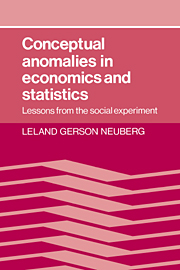Book contents
- Frontmatter
- Contents
- Preface
- Introduction
- PART I STATISTICAL LOGICS
- Chapter 1 J. S. Mill and some philosophical underpinnings of controlled experimentation
- Chapter 2 R. A. Fisher, randomization, and controlled experimentation
- Chapter 3 Some special difficulties of controlled social experiments
- Chapter 4 Hume's problem of induction in modern statistical inference and controlled experimentation
- Summary and conclusion of Part I
- PART II ECONOMIC LOGICS
- Conclusion: Some possible barriers to controlled social experiments as science
- Appendix: Proofs of theorems, lemmas, and propositions
- References
- Symbols and abbreviations
- Index
Chapter 1 - J. S. Mill and some philosophical underpinnings of controlled experimentation
Published online by Cambridge University Press: 16 February 2010
- Frontmatter
- Contents
- Preface
- Introduction
- PART I STATISTICAL LOGICS
- Chapter 1 J. S. Mill and some philosophical underpinnings of controlled experimentation
- Chapter 2 R. A. Fisher, randomization, and controlled experimentation
- Chapter 3 Some special difficulties of controlled social experiments
- Chapter 4 Hume's problem of induction in modern statistical inference and controlled experimentation
- Summary and conclusion of Part I
- PART II ECONOMIC LOGICS
- Conclusion: Some possible barriers to controlled social experiments as science
- Appendix: Proofs of theorems, lemmas, and propositions
- References
- Symbols and abbreviations
- Index
Summary
Introduction: An ancient example
Writing in 1949, the psychologist Richard L. Solomon observed: “The history of the idea of a controlled experiment is a long one. Usually one goes back to J. S. Mill's canons for the concept of experimental controls” (p. 137). Recent historical research, however, reveals that one has to go a good deal further back than Mill for the origin of controlled experimentation. Consider the following passage from the Old Testament:
In the third year of the reign of Jehoiakim of Judah, Nebuchadnezzar king of Babylon came to Jerusalem and laid siege to it. The Lord delivered Jehoiakim king of Judah into this power, together with all that was left of the vessels of the house of God; and he carried them off to the land of Shinar, to the temple of his god, where he deposited the vessels in the treasury. Then the king ordered Ashpenaz, his chief eunuch, to take certain of the Israelite exiles, of the blood royal and of the nobility, who were to be young men of good looks and bodily without fault, at home in all branches of knowledge, well-informed, intelligent, and fit for service in the royal court; and he was to instruct them in the literature and language of the Chaldaeans. The king assigned them a daily allowance of food and wine from the royal table. Their training was to last for three years, and at the end of that time they would enter the royal service.
- Type
- Chapter
- Information
- Conceptual Anomalies in Economics and StatisticsLessons from the Social Experiment, pp. 15 - 35Publisher: Cambridge University PressPrint publication year: 1989



